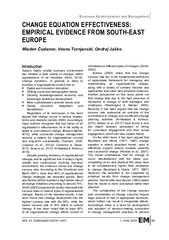Please use this identifier to cite or link to this item:
https://rfos.fon.bg.ac.rs/handle/123456789/1909Full metadata record
| DC Field | Value | Language |
|---|---|---|
| dc.creator | Čudanov, Mladen | |
| dc.creator | Tornjanski, Vesna | |
| dc.creator | Jaško, Ondrej | |
| dc.date.accessioned | 2023-05-12T11:20:18Z | - |
| dc.date.available | 2023-05-12T11:20:18Z | - |
| dc.date.issued | 2019 | |
| dc.identifier.issn | 1212-3609 | |
| dc.identifier.uri | https://rfos.fon.bg.ac.rs/handle/123456789/1909 | - |
| dc.description.abstract | This study was developed with the aim to propose quantitative decision-making model in organizational change management, which is based on change equation application in real time, as an emerging ecosystem that should be further adopted in change management practice to create value in complex decision making and at the same time to increase change success. The paper opted for an integrated qualitative and quantitative research methods, based on empirical data collection. Sampling frame includes respondents from fourteen different industries in South-East Europe. Data analyses were carried out in three main phases using proven statistical methods. Based on the results, general hypothesis introduced in the study is supported. In other words, successful change occurs when the product of all three variables, i.e. D, V and F is higher than resistance to change, and vice versa. Also, research results show that change equation can successfully predict change outcome and explain a portion of change success variability. Finally, research findings indicate that the model should be revised and further developed. Research limitations are determined by significant variance in the model that may result of situational factors. Also, the research was based on a relatively limited sample and focused only on data collection from South-East Europe. Despite its limitations, this study can contribute both to theorists and practitioners. First, the paper contributes to the change management theory, business decision-making theory, organizational development theory and the behavioral theory. Second, the paper can contribute to strategic managers, change leaders, change agents and consultants who deal with change management by adopting the upgraded change model that can be applied in all phases of change process, including measurement of the change outcome. | en |
| dc.publisher | Technical Univ Liberec, Liberec 1 | |
| dc.rights | openAccess | |
| dc.rights.uri | https://creativecommons.org/licenses/by-nc/4.0/ | |
| dc.source | E & M Ekonomie A Management | |
| dc.subject | quantitative decision-making model | en |
| dc.subject | organizational change management sustain ability | en |
| dc.subject | change success | en |
| dc.subject | change equation | en |
| dc.subject | Beckhard and Harris change model | en |
| dc.title | Change equation effectiveness: empirical evidence from south-east Europe | en |
| dc.type | article | |
| dc.rights.license | BY-NC | |
| dc.citation.epage | 114 | |
| dc.citation.issue | 1 | |
| dc.citation.other | 22(1): 99-114 | |
| dc.citation.rank | M22 | |
| dc.citation.spage | 99 | |
| dc.citation.volume | 22 | |
| dc.identifier.doi | 10.15240/tul/001/2019-1-007 | |
| dc.identifier.fulltext | http://prototype2.rcub.bg.ac.rs/bitstream/id/552/1905.pdf | |
| dc.identifier.rcub | conv_2157 | |
| dc.identifier.scopus | 2-s2.0-85069156592 | |
| dc.identifier.wos | 000461177700007 | |
| dc.type.version | publishedVersion | |
| item.cerifentitytype | Publications | - |
| item.fulltext | With Fulltext | - |
| item.grantfulltext | open | - |
| item.openairecristype | http://purl.org/coar/resource_type/c_18cf | - |
| item.openairetype | article | - |
| Appears in Collections: | Radovi istraživača / Researchers’ publications | |
SCOPUSTM
Citations
7
checked on Nov 17, 2025
Page view(s)
16
checked on Dec 28, 2025
Download(s)
8
checked on Dec 28, 2025
Google ScholarTM
Check
Altmetric
This item is licensed under a Creative Commons License


